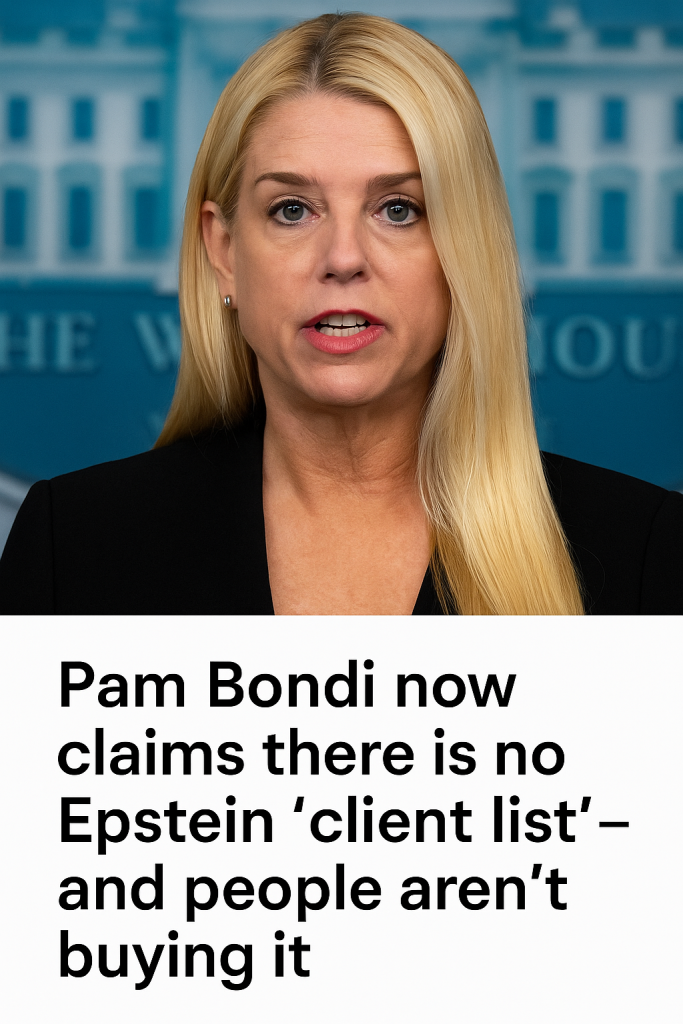The Trump administration’s long-promised public release of federal investigation records related to Jeffrey Epstein has encountered a fresh wave of controversy, following recent statements from Pam Bondi, the former Florida Attorney General. Amid rising public expectation, Bondi now firmly denies the existence of a so-called “Epstein client list,” a claim that has met significant skepticism and renewed calls for transparency.
Jeffrey Epstein, who died in jail in 2019 while awaiting trial on federal sex trafficking charges, was at the center of intense scrutiny due to his extensive network and alleged involvement with prominent figures. The release of documents connected to federal investigations under the Trump administration was expected to shed light on the scope of Epstein’s trafficking ring and potentially reveal key clients or enablers. However, the situation took a turn as Bondi stated publicly that no such “client list” exists.
The Controversy
Bondi’s denial comes at a time when survivors, advocacy groups, and lawmakers have been demanding accountability and the fullest possible disclosure of the investigation’s records. “There is no secret client list when it comes to Epstein,” Bondi asserted, emphasizing that many names purported to be on such lists have been publicly debunked or are based on speculation rather than evidence. However, this declaration has only fueled skepticism among the public and media commentators, many of whom argue that the phrase “client list” may be a simplified way to refer to documents that have not yet been released in full.
Multiple sources have suggested that victims and activists had been anticipating newly declassified records that might name individuals connected to Epstein’s criminal enterprise, including those who might have facilitated or benefited from the sex trafficking ring. The delay or partial withholding of these documents has raised questions about political motivations and the adequacy of the investigative process.
Trump Administration and Record Releases
The Trump administration initially committed to unprecedented transparency concerning the Epstein case records. Promises were made to make many files public, aiming to allow independent scrutiny of the investigation and the broader network. Yet as 2024 unfolds, these documents have only been partially made available, and their contents are often heavily redacted.
Experts warn that secrecy or incomplete disclosures can erode public trust, especially in high-profile cases involving powerful individuals. The administration’s approach has attracted criticism for appearing to slow-walk the release of information that might provide justice and clarity.
Social media and public reaction have reflected this frustration. Many users express doubt about Bondi’s assertion, sharing theories and calls for more comprehensive releases. The narrative that a “client list” might be hidden somewhere fuels conspiracy theories and amplifies public demand for answers.
The Broader Implications
The Epstein case has become emblematic of the challenges in prosecuting complex sex trafficking networks that involve influential figures. Transparency about federal investigations is seen as crucial not only for victims seeking justice but also for preventing systemic abuses from persisting unchecked.
As 2024 progresses, the tension between promises of disclosure and allegations of withholding documents underscores a broader conversation about accountability and trust in public institutions. Whether further releases will affirm or dispel the rumors of a “client list” remains to be seen, but the pressure from advocacy groups and the public for full transparency is unlikely to wane.
In Summary:
- Pam Bondi, former Attorney General, denies existence of an Epstein “client list.”
- Her claims face widespread skepticism amid ongoing demands for document releases.
- The Trump administration has provided only partial access to federal investigation records concerning Epstein.
- Victims and activists



